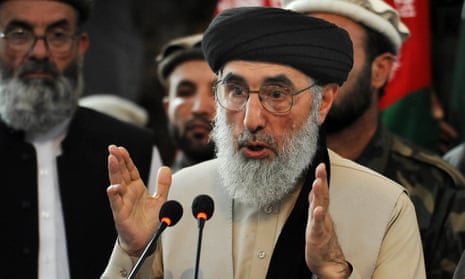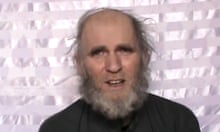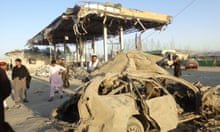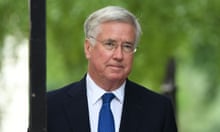When Gulbuddin Hekmatyar, a fugitive Afghan warlord and former ally of al-Qaida and the Taliban, returned this year to the city he had once showered with rockets, he was welcomed at the presidential palace.
Hekmatyar had been on lists of internationally wanted terrorists for years but, since his return to Kabul in May, he has met scores of high-ranking diplomats, including the US, EU and Nato ambassadors, as part of his assimilation into mainstream politics.
Hekmatyar, whose crimes were pardoned in a peace deal with the government, now himself calls for the prosecution of war criminals. In two interviews with the Guardian – the first with international media since his return – he said he could unite Afghans and help facilitate negotiations with the Taliban.
When the Guardian put to him allegations of war crimes and torture, he dismissed them as “lies”. He also denied he is reviled for his history of human rights abuse, including the indiscriminate shelling of civilians, targeted assassinations and disappearances of political opponents.
“If you have made a survey and found a lot of people who have this point of view, please present it to us,” he said.
His longtime aide, Amin Karim, said protests against Hekmatyar’s return had been negligible. “How many? We counted 43 people,” he said.
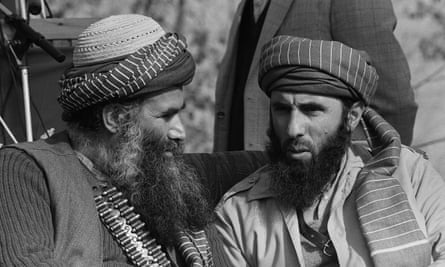
As the leader of one of Afghanistan’s main political parties, Hezb-i Islami, Hekmatyar does have supporters. But he remains notorious both at home and abroad.
Now, however, he has joined a roster of ageing warlords in powerful positions inside and outside government whose main leverage is their potentially disruptive power bases, and who appear to contribute little to policymaking or state-building.
The vice-president Abdul Rashid Dostum, a strongman whose reputation vies with that of Hekmatyar, has formed a protest alliance including the foreign minister and a governor accused of running abusive militias. They met in Turkey where Dostum has lived since coming under investigation for the rape of a political rival.
Recently, the Guardian accompanied Hekmatyar as he strode into a mosque in a poor eastern Kabul neighbourhood to lead Friday prayers. His sermon revolved around politics. His party plans to participate in forthcoming parliamentary elections, but he has not decided if he wants to run for the presidency in 2019, he says.
A few weeks earlier, a worshipper at a mosque in Herat hurled a shoe at Hekmatyar, a deeply offensive act to Muslims. Hezb-i Islami said the shoe attack had been planned by a foreign intelligence agency.
Hekmatyar still moves with the discretion of a former fugitive, slipping unaccompanied through the backdoor for interviews and arriving announced at mosques. His security detail doesn’t know which mosque he is planning to visit before they leave his fortified compound.
He insisted that he had never left Afghanistan, though foreign intelligence officials said he was in Pakistan for a period. He keeps a routine he maintained in the mountains, rising early for prayer, reading world news – now on social media – and taking long afternoon naps. Styling himself as a scholar, he says he has written more than 80 books.
Hekmatyar was once a hero. In the 1980s he received more US assistance to fight the Soviet invasion than any other mujahideen, and many Afghans saw him as a champion of the resistance.
However, in the ensuing civil war, Hekmatyar became vilified for his indiscriminate shelling of Kabul, which earned him the moniker “Rocketyar”. His followers are accused of running torture camps and attacking women with acid.
He later turned against his former American patrons, supporting and orchestrating attacks on US forces and civilians in Afghanistan. He claimed to have helped Osama bin Laden escape the Tora Bora mountains after 2001. Hekmatyar still talks to the Taliban and offered to be a go-between.
“Their position has changed. The Taliban are now more eager for peace,” he said. “We should open our arms to negotiation and we should accept all their reasonable conditions.”
As part of the peace deal, which the Afghan government hopes will entice the Taliban to negotiate, the UN removed Hekmatyar from its sanctions lists. The EU is committing €3m (£2.69m) to implementing the deal, including for “ad-hoc demands”.
Excellent meeting with HE Gulbuddin Hekmatyar, discussing the future of #Afghanistan. pic.twitter.com/PpSOb4B1nw
— Aus in Afghanistan (@AusEmbAfg) August 27, 2017
However, critics have said the government conceded too much, and the veneration bestowed on Hekmatyar by some foreign dignitaries has irked many Afghans.
As a kid in 1992, I had lost my sleep because of his rockets! Feared and had nightmare! Such a shame to call him HE! @dfat
— Asef Mehry (@MMehry) August 30, 2017
Human Rights Watch called the deal “an affront to victims of grave abuses”, which compounds a “culture of impunity” fostered by the government and foreign donors.
Meanwhile, Hekmatyar called for others to be punished. “The families of martyrs must be respected,” he said. “If it is possible to punish the killers of these people, and people who did war crimes, we will support such courts.”
Hekmatyar was not the only commander to shell Kabul. But he is perhaps the most unrepentant.
“We did not fire a single shot on civilian areas,” he said, rejecting extensive documentation by human rights organisations of his atrocities. “I wish there was one of these organisations that was trustworthy,” he added.
Majid, a Kabul resident, was a teenager during the civil war when Hekmatyar’s fighters bombarded his neighbourhood in Darulaman daily. Killings were so common that his family stocked burial materials in the house. One day a rocket hit a relative’s house, killing four children. “We were not able to recognise which body part belonged to which kid,” said Majid.
However, the peace accord has its supporters. “No one can deny that warlords destroyed the country, but we live in the present. It will be difficult at first, but people must give up something in order to achieve peace,” said Faiza Ibrahimi, a female journalist in Herat.
Others are more sceptical. “I am afraid his return will increase political conflicts, and I’m concerned that civil war could break out again,” said Babur Eitook, a visitor to Herat. “People will never forget his crimes.”
Additional reporting by Aziz Ahmad Tasal in Kabul and Akhtar Mohammad Makooi in Herat.
